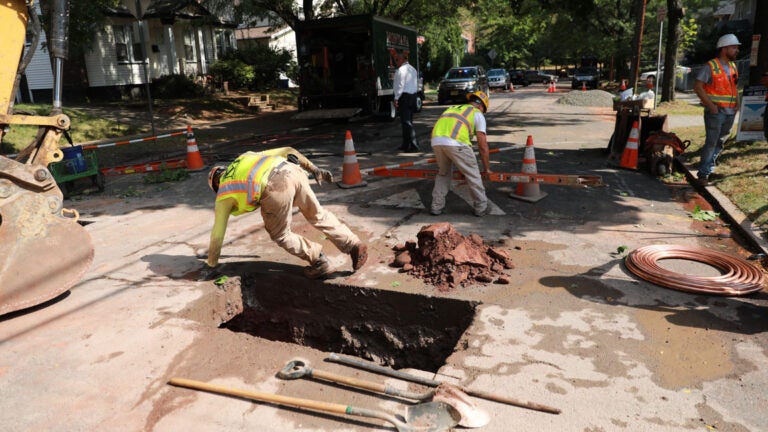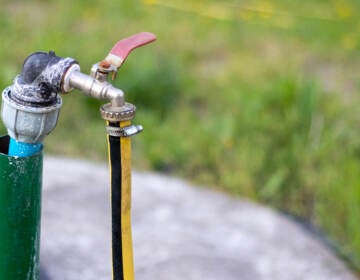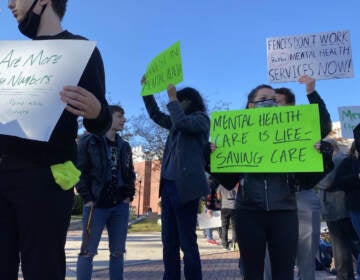Replacement of unsafe lead service lines delayed by pandemic’s economic fallout
Murphy administration eliminates plan to spend $80 million to start replacing the lines

Lead service lines being replaced in Newark, summer 2019. The city’s replacement program is expected to be completed well ahead of schedule. A schedule for the rest of the state is up in the air. (Governor's office)
This story originally appeared on NJ Spotlight.
Much of New Jersey looks like it will have to wait a lot longer to replace hundreds of thousands of lead service lines fouling up drinking water supplies across the state with unsafe levels of lead.
The Murphy administration says it faces a potential $10 billion shortfall in the state budget and it needed to eliminate $80 million in funding it hoped to secure to begin replacing the 330,000 lead service lines in New Jersey.
The issue of lead service lines causing unsafe levels of the contaminant in drinking water is one of the huge unsolved problems state policymakers have wrestled with over the past few years. According to the state Department of Environmental Protection, the projected cost to replace the tainted lines could run northward of $2 billion.
Gov. Phil Murphy proposed in his budget address this past February using a supplemental appropriation of $80 million in the 2021 fiscal year to start replacing the lines, which leach the pollutant in drinking water. It never won approval, largely because of the COVID-19-related shutdown, which triggered steep drops in revenue from the corporate business tax.
Last October, the governor called for a $500 million bond issue to address the problem, but that was forgotten in the economic fallout of the largest public health crisis in more than a century.
“The short-term outlooks pretty bleak,’’ conceded Gary Brune, policy manager at New Jersey Future, an organization that has been in the forefront of having the state better manage its issues with water infrastructure. “Obviously, the lead proposals haven’t gone anywhere.’’
The administration declined to comment on specific funding except to say that any future appropriations on lead are expected to be jointly decided with the Legislature.
Why Newark is the exception
The exception, however, is Newark, Brune said. The city, tapping a $130 million bond issue from the Essex County Improvement Authority, now expects to replace lead service lines in the community within three years, a lot shorter than what originally was projected to take a decade. “It’s unprecedented,’’ Brune said.
Last October, New Jersey Future proposed addressing the problem statewide by a combination of rate increases for water customers and the $500 million bond issue. Now, the organization is hoping to start moving on the problem by tapping a $110 million allocation to New Jersey that would allow federal clean water funds to be used for fixing lead drinking water problems, Brune said.
“It’s not a lot of money, but you can start moving on the problem,’’ Brune said. The money came available under a bill sponsored by U.S. Sen. Cory Booker (D-NJ).
For the most part, advocates for quicker action on replacing lead service lines recognized the problems caused by the pandemic.
“It’s really a tough situation,’’ said Dave Pringle, a consultant for Clean Water Action. “We clearly don’t have the money for the things that need to be funded.’’
The state’s water infrastructure, some of it more than a century old, needs more than $20 billion to upgrade aging systems, according to the federal government. The needs far exceed the ability of the state system of financing such upgrades, although in recent years, it has allocated more money to solving issues of lead in drinking water.
“The budget crunch is painful and it’s going to hurt everybody,’’ said Doug O’Malley, director of Environment New Jersey. “Everything has changed. It does feel like lead isn’t on anyone’s radar screen.’’

Get daily updates from WHYY News!
WHYY is your source for fact-based, in-depth journalism and information. As a nonprofit organization, we rely on financial support from readers like you. Please give today.



![CoronavirusPandemic_1024x512[1]](https://whyy.org/wp-content/uploads/2020/03/CoronavirusPandemic_1024x5121-300x150.jpg)


